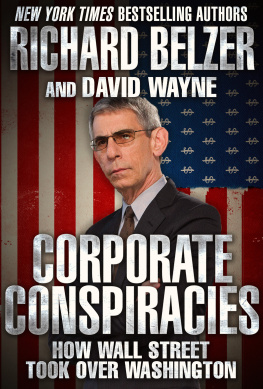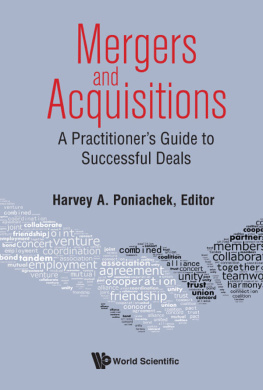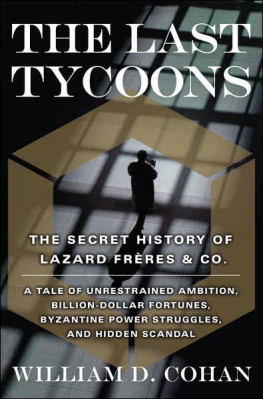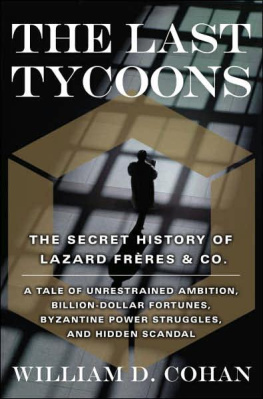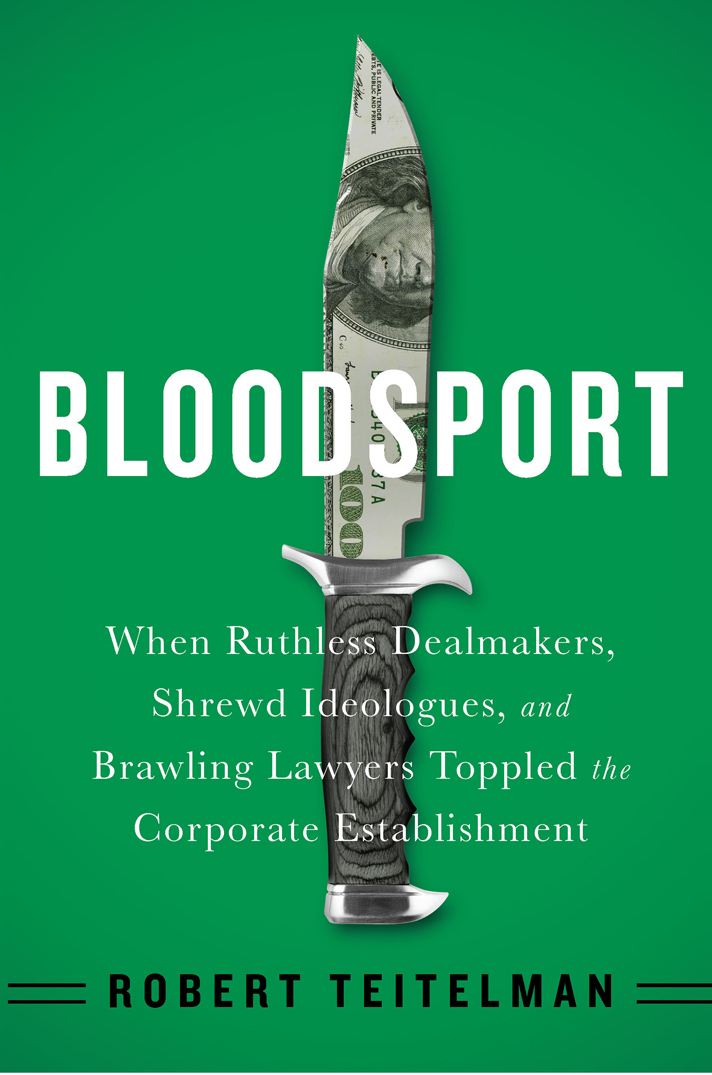

Copyright 2016 by Robert Teitelman
Published in the United States by PublicAffairs,
A Member of the Perseus Books Group
All rights reserved.
Printed in the United States of America.
No part of this book may be reproduced in any manner whatsoever without written permission except in the case of brief quotations embodied in critical articles and reviews. For information, address PublicAffairs, 250 West 57th Street, 15th Floor, New York, NY 10107.
PublicAffairs books are available at special discounts for bulk purchases in the US by corporations, institutions, and other organizations. For more information, please contact the Special Markets Department at the Perseus Books Group, 2300 Chestnut Street, Suite 200, Philadelphia, PA 19103, call (800) 810-4145, ext. 5000, or e-mail .
A CIP catalog record is available from the Library of Congress
ISBN 978-1-61039-414-7 (EB)
First Edition
10 9 8 7 6 5 4 3 2 1
The world is not the way they tell you it is.
ADAM SMITH, The Money Game, 1967
Now whats going to happen to us without barbarians?
They were, those people, a kind of solution.
C. P. CAVAFY, Waiting for the Barbarians
Table of Contents
Guide
CONTENTS
E . I. DU PONT de Nemours and Company was hardly the sort of corporation, and Edward Garland Jefferson hardly the kind of chief executive, we would expect to find in one of the messiest takeover brawls in US history. DuPont was the oldest big corporation in America, founded in 1802 to manufacture gunpowder along the banks of Brandywine Creek outside Wilmington, Delaware, by the son of a French physiocratan early economistfleeing the French Revolution. DuPont had, through war and peace, crisis and prosperity, grown into one of Americas preeminent R&D-driven companiesa pioneer of industrial science on par with AT&T and General Electricdeveloping and selling everything from plastics to paints to space-age textiles to myriad other advanced chemically based products. The company had long been family controlled and operated; the countryside around Wilmington was thick with cousins living as rentiers off the stock. Pierre du Pont and his two cousins, all MIT-trained, had acquired the thenmunitions maker in 1902 from family members who were, as a history of DuPont research notes, tired, leaderless and ready to sell out to businessmen who were not du Ponts. The cousins undertook a series of acquisitions of chemical rivals (stirring the companys first antitrust woes) and transformed management with innovative techniques and investments in science-based product development. In 1914, Pierre acquired a stake in then-foundering General Motors, joined its board, became its president, and DuPont eventually took control. DuPont also designed, built, and operated the Hanford works in Washington State that produced plutonium for atomic weaponry. Its legacy as a munitions maker was an ambiguous and increasingly troublesome oneprofitable yet also hazardous (plants occasionally blew up) and controversial. DuPont psychologically (if a company can have a psychology) never really recovered from being a target of the congressional Nye Committee in the 1920s, which investigated wartime business practices and hung the label merchant of death around its metaphorical neck.
The 1970s had been hard on DuPont, as it had for many US corporations. Key raw material costsnotably oilspiked, and competition, mostly in its massive textiles business, mounted. The stock sank. The federal government had awakened to environmental degradation, and it hit chemical makers (not to say builders of plutonium-producing reactors) hard. DuPonts old nemesis, antitrust, loomed. In 1971, the last du Pont CEO and chairman, Lammot Mots du Pont Copeland, retired. (The history of DuPont research notes dryly that Copeland would not turn out to be a propitious choice to run the company. For the first time in decades, Shapiro made modest cuts to the all-but-sacrosanct research budget and raised questions about R&D. He took the initial steps to reduce dependence on textiles. In 1973, DuPont quietly shuttered the last black gunpowder facility, in Moosic, Pennsylvania. Unlike a long line of DuPont executives, Shapiro made himself a spokesman for corporate America, was active at the Business Roundtable, and was heretically close to Jimmy Carter (the du Pont family was, in the main, cloth-coat Republican). He retired in 1981, at age sixty-four, and accepted a partnership with an up-and-coming New York law firm, Skadden Arps Meagher & Flom, run by a diminutive, combative mergers-and-acquisitions attorney named Joe Flom, and opened a Skadden outpost in Wilmington, where the nations preeminent state corporate-law courts operated.
Ed Jefferson, fifty-nine, succeeded Shapiro. The lanky Jefferson was not a du Pont, although his ascension returned DuPont to its tradition, dating back to the cousins, of placing a technical man at the helm. Jefferson was British, raised in London, with a soft English accent and a predilection for amateur singing. What Jefferson may not have recognized is what a leap molecular biology was from traditional chemistry, and how the newly emerging biotechnology industryGenentech went public in a spectacular initial public offering in October 1980was already undermining the hegemony of large, stable, centralized, industrial-style corporate research efforts.
And yet for all the talk of life sciences, Jefferson made a move weeks after assuming leadership that drove DuPont in a totally different direction. On June 7 he announced an offer for an oil company, Conoco, the ninth-largest corporation in America, and one slightly larger, by revenue, than DuPont. Conoco provided a solution to DuPonts thirst for oila strategic need that looked back to the crises of the 70s rather than forward to the nascent wonders of life sciences. The plan emerged out of DuPonts strategic planning bureaucracy, and it decisively shaped Jeffersons tenure at the top of DuPont: defense, not offense. It also represented, at $7.57 billion in cash and stock, the largest mergers-and-acquisitions transaction in history. DuPont, which had not engaged in many acquisitions under Mots Copeland and had a balance sheet with little debt, could afford it.
What Jefferson may not have fully comprehended was the maelstrom he was entering, so different from the coolly deliberative processes of the DuPont bureaucracy. DuPont was a fortress, and high-corporate life had its hierarchies, its rituals, its sense of propriety, even its romance. DuPont in particular believed its history and achievements insulated it from a rapidly changing corporate world, though the 70s had breached some outer walls. Shapiro, a lawyer, a Jew, an outsider throughout all his years of loyal service, had sensed the magnitude of change. Takeover battles, like the one for Conoco, featuring unrestrained financial forces, legalism gone mad, a profound market relativism, and an ethos of victory at all costs, was just the most visible sign. The corporation was losing control over its destiny; the CEO was a potentate dragged into a democratic marketplace. Attitudes toward shareholders, workers, customers, toward pay, toward a rooted past and any sense of legacy, would now be put under vise-like pressures. Outsiders were re-imagining the very governance of the corporationthe legal and ethical code that structured its operations, the mechanisms of control and participation.



